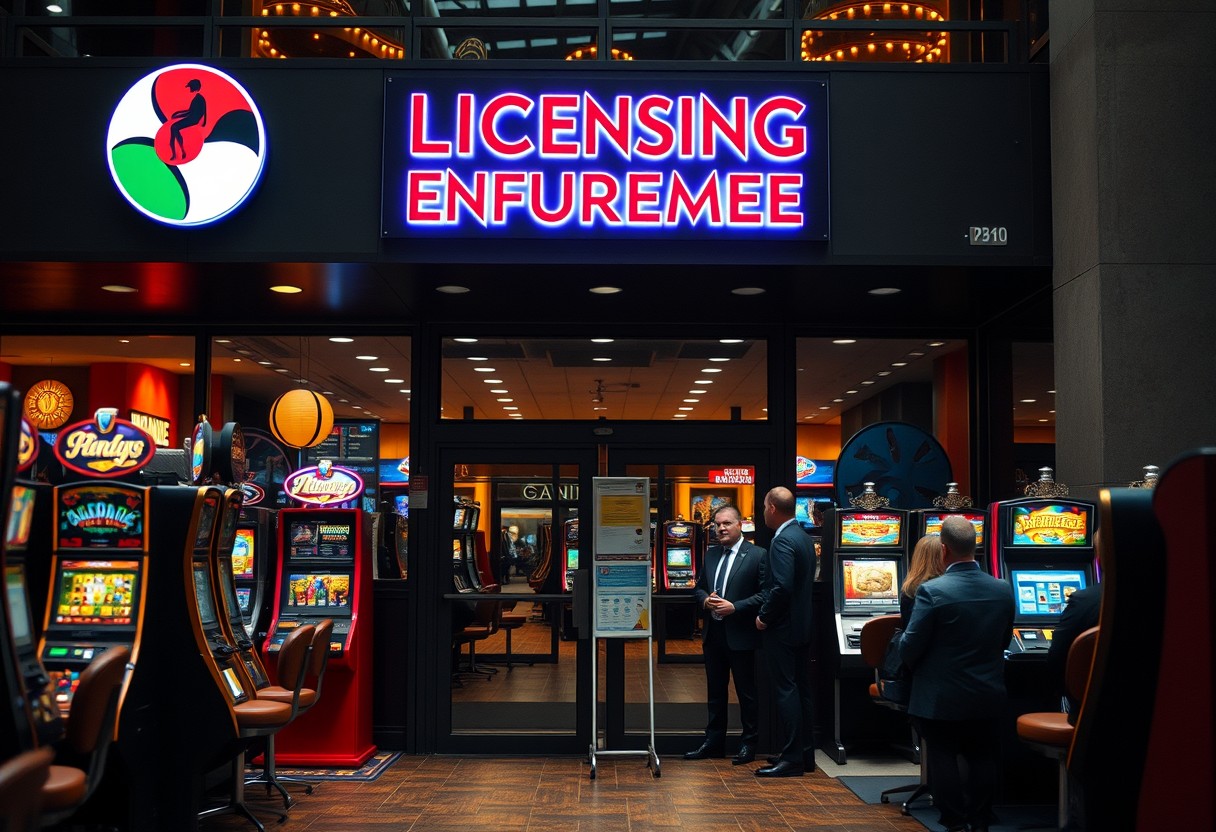Netherlands Tightens Gambling Regulations

Just when the gambling industry thought it could operate with fewer restrictions, the Netherlands is making headlines with its stringent licensing enforcement. As the nation moves to regulate online and land-based casinos, the implications for operators are significant. This blog post explores into the reasons behind this crackdown and explores the potential consequences for casinos that fail to comply with new regulations. Understanding these changes is critical for industry players looking to navigate the evolving landscape of Dutch gaming law.
Overview of Licensing in the Netherlands
Your understanding of the Netherlands' licensing framework for gambling is crucial, as it is designed to ensure fair play, protect consumers, and prevent illegal activities. The country transitioned from a restricted gambling landscape to a regulated environment, providing a legal framework for land-based and online casinos. This evolution reflects a commitment to responsible gambling, accountability, and transparency within the industry.
History of Gambling Legislation
With the introduction of the Betting and Gaming Act in 1964, the Netherlands began formalizing its approach to gambling. Initially focused on state-run lotteries and betting activities, the legislation evolved over decades as societal attitudes towards gambling changed. Efforts to create a more comprehensive regulatory framework culminated in the adoption of the Remote Gambling Act in 2021, paving the way for a more versatile and competitive market.
Current Regulatory Framework
Current regulatory measures are governed by the Remote Gambling Act, which came into effect on April 1, 2021. This act allows online casinos to operate legally under stringent conditions while ensuring player safety and compliance with national laws.
It is vital to understand that the current regulatory framework encompasses a licensing process managed by the Dutch Gaming Authority (Kansspelautoriteit). This authority imposes strict guidelines for operators, including transparency in operations, safeguarding player funds, and implementing responsible gambling measures. Casinos must adhere to rigorous auditing protocols and continuous compliance checks, reflecting a commitment to maintaining a sustainable and trustworthy gambling environment. These regulations serve not only to protect consumers but also to foster a fair competitive space among operators, enhancing the integrity of the gambling industry in the Netherlands.
Enforcement Mechanisms
Clearly, the enforcement mechanisms in place for the Netherlands' gaming sector are designed to ensure strict compliance with regulations. The authorities utilize various tools including audits, investigations, and sanctions to uphold the integrity of the gaming environment. These measures aim to deter illegal activities and promote fair play within licensed establishments, fundamentally reshaping how casinos operate in the region.
Role of the Dutch Gaming Authority
Dutch Gaming Authority plays a pivotal role in overseeing the gaming industry. Tasked with enforcing regulations, this independent body ensures that all operators adhere to the law, safeguarding the interests of players and society at large. Through monitoring and regulatory interventions, the Authority reinforces a level playing field for all licensed casinos.
Compliance Requirements for Casinos
Dutch legislation mandates comprehensive compliance requirements for casinos to maintain their gaming licenses. These requirements encompass financial transparency, responsible gaming practices, and robust security measures to protect players and their data.
Plus, casinos must implement thorough internal controls and employee training programs to align with compliance standards. Regular reporting to the Dutch Gaming Authority and undergoing routine audits are crucial for sustaining operational legitimacy. Non-compliance can lead to severe penalties, including license suspension or revocation, emphasizing the importance of stringent adherence to these regulations.
Implications for Casino Operations
If the Netherlands' licensing enforcement continues on its current trajectory, casinos may need to drastically revise their operational strategies. Compliance with stricter regulations will require enhanced transparency, employee training, and documentation processes, which could lead to significant adjustments in both management and financial resources.
Impact on Existing Casinos
One significant consequence for existing casinos is the immediate necessity to upgrade compliance measures. This demand can strain resources and may lead to increased operational costs, as casinos will likely face more rigorous audits and heightened scrutiny from regulators.
Challenges for New Market Entrants
For new market entrants, navigating the evolving regulatory landscape presents substantial challenges. Establishing a foothold in a highly regulated environment requires not only a strong business model but also a commitment to compliance that can deter potential investors.
The entry barriers for new casinos in the Netherlands are escalating. These challenges include the need to secure comprehensive licenses, which now demand rigorous vetting processes and substantial financial commitments. Moreover, unfamiliarity with the stringent regulatory framework can result in costly missteps, inhibiting new operators from effectively competing with established players. Developing strong relationships with local authorities and understanding consumer expectations will also be critical to overcoming these hurdles.
Risks of Non-Compliance
All casinos operating in the Netherlands must recognize the significant risks associated with non-compliance with licensing regulations. Failure to adhere to these regulations can lead to severe legal repercussions, tarnish reputations, and diminish customer trust. As the Netherlands strengthens its stance on regulatory enforcement, casinos must prioritize compliance to avoid jeopardizing their operations and potential profitability.
Financial Penalties
To underscore the seriousness of compliance, financial penalties for violating gambling regulations can be substantial. Fines may escalate quickly, resulting in significant losses that could disrupt cash flow and impede a casino's growth and development. Additionally, repeated breaches could lead to more severe sanctions, potentially threatening the casino's license altogether.
Operational Disruptions
For casinos, operational disruptions stemming from non-compliance can manifest in various ways, significantly impacting their day-to-day functioning. Regulatory investigations might lead to temporary closures, restricting their ability to generate revenue and serve customers. Moreover, restrictions imposed by regulators can also limit the types of games offered, leading to a diminished player experience and potential loss of clientele.
Disruptions in operations can extend beyond closures and game restrictions. They may lead to increased scrutiny and oversight from regulatory bodies, creating ongoing operational challenges. With compliance reviews becoming a routine part of business practices, management may find themselves allocating resources toward meeting regulatory demands instead of focusing on enhancing the customer experience. Such disruptions can ultimately harm brand reputation and hinder long-term success in a highly competitive market.
Best Practices for Compliance
Unlike in previous years, adhering to licensing regulations is now crucial for casinos operating in the Netherlands. By implementing best practices such as robust internal controls and comprehensive training programs, casinos can navigate the complex regulatory environment effectively. Engaging with legal experts to stay updated on the evolving compliance landscape is crucial for securing a competitive edge and ensuring long-term sustainability in the industry.
Developing a Compliance Culture
Developing a compliance culture within a casino organization is not merely a checkbox exercise; it involves embedding compliance principles into every aspect of operations. This includes fostering open communication, encouraging staff involvement, and prioritizing training sessions that focus on regulatory requirements. A strong compliance culture ensures that employees at all levels understand the importance of following procedures to mitigate risks associated with regulatory violations.
Regular Audits and Assessments
On the other hand, conducting regular audits and assessments is a pivotal strategy in maintaining compliance. By systematically evaluating operations against existing regulations and internal policies, casinos can identify potential vulnerabilities before they escalate into serious issues. These assessments not only enhance accountability but also demonstrate a commitment to upholding industry standards.
For instance, implementing a quarterly audit process allows casinos to scrutinize their processes and identify discrepancies that may expose them to compliance risks. Data analytics tools can be incorporated to review patterns in gameplay and financial transactions, ensuring transparency and accuracy. Regular audits serve as a proactive measure, enabling casinos to make necessary adjustments in real-time and uphold their license commitments efficiently.
The Future of Casino Regulation in the Netherlands
Despite the current regulatory landscape, the future of casino regulation in the Netherlands is likely to evolve significantly. As authorities continue to adapt to emerging trends in the gambling industry, the focus will shift towards implementing more stringent measures to ensure responsible gaming and consumer protection. This evolution could pave the way for improved oversight and transparency, ultimately enhancing public trust in gaming establishments and their operations.
Potential Legislative Changes
Any forthcoming legislative changes are expected to address the gaps identified during recent enforcement actions. Policymakers may explore adjustments to licensing requirements, compliance standards, and penalties for violations. Such changes could strengthen the regulatory framework, encourage accountability among operators, and ensure that consumer interests remain a priority within the rapidly changing landscape of the gambling sector.
Trends in Regulatory Enforcement
Changes in regulatory enforcement are becoming increasingly evident as the Netherlands' gambling sector matures. Authorities are prioritizing proactive measures, emphasizing responsible gaming practices and ethical business operations among licensed casinos. This shift represents a departure from reactive enforcement, aiming instead to foster a culture of compliance that not only safeguards players but also supports sustainable growth within the industry.
For instance, recent enforcement actions have highlighted the necessity for casinos to implement robust risk management systems that monitor player behavior and detect potential issues before they escalate. This proactive approach not only mitigates risks but also signals to operators that regulators are committed to maintaining a fair and safe gambling environment. As enforcement trends continue to evolve, casinos may find themselves under increasing scrutiny to comply with best practices, ultimately benefiting both the industry and its patrons.
Final Words
With these considerations, it is clear that the Netherlands' licensing enforcement serves as a significant wake-up call for casinos operating both domestically and internationally. The stringent regulations not only ensure consumer protection and expectations of compliance but also elevate the standards within the gaming industry as a whole. Recognizing and adapting to these legal frameworks will be crucial for casino operators to thrive in an evolving regulatory landscape, urging a shift towards greater accountability and responsible gaming practices.
FAQs
What is the Remote Gambling Act?
The Remote Gambling Act, effective from April 1, 2021, allows online casinos to operate legally under strict conditions, ensuring player safety and compliance.
Why is the Dutch Gaming Authority important?
The Dutch Gaming Authority oversees the gaming industry, enforcing regulations to protect players and ensure fair operations among licensed casinos.
What are the consequences of non-compliance for casinos?
Non-compliance can lead to severe penalties, including financial fines, operational disruptions, and potential license suspension or revocation.
How can casinos ensure compliance with new regulations?
Casinos can ensure compliance by implementing robust internal controls, conducting regular audits, and fostering a culture of compliance among staff.
What future changes can we expect in Dutch gambling regulations?
Future changes may include stricter licensing requirements, updated compliance standards, and increased penalties for violations to enhance consumer protection.
Michael
With over 20 years experience in web design, SEO and website promotion I always give you an expert advice in regard to any issues related to your Site Design, SEO, Internet Marketing, Promotion, Backlinks, Site Content. In order to help you find out what is missing or can be improved and get higher rankings in Google and more traffic.
Recommended Posts

Gamanza Games Expands into the Dutch Market
October 5, 2024

Irina Cornides: Innovating Pragmatic Play
October 5, 2024

Evolution’s Live Casino Studio Opens in Prague
October 5, 2024




